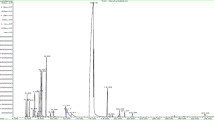Abstract
DURING our studies on microbiological problems in the citrus industry, we found it necessary to study the effect of essential oils on micro-organisms. As a first step in this study, we investigated in a synthetic medium the influence of d-limonene, which constitutes more than 90 per cent of the orange essential oil, on micro-organisms normally present on the surface of oranges.
This is a preview of subscription content, access via your institution
Access options
Subscribe to this journal
Receive 51 print issues and online access
$199.00 per year
only $3.90 per issue
Buy this article
- Purchase on SpringerLink
- Instant access to the full article PDF.
USD 39.95
Prices may be subject to local taxes which are calculated during checkout
Similar content being viewed by others
References
Hinshelwood, C. N., “The Chemical Kinetics of the Bacterial Cell” (Clarendon Press, Oxford, 1946).
Mark, H., “The Mechanism of Polyreactions”, “Frontiers in Chemistry”, 1 (Interscience Pub., Inc., New York, 1943).
Ziegler, K., “Preparative Organic Chemistry”, FIAT Review of German Science, 1939–1946.
Author information
Authors and Affiliations
Rights and permissions
About this article
Cite this article
ZUKERMAN, I. Effect of Oxidized d-Limonene on Micro-organisms. Nature 168, 517 (1951). https://doi.org/10.1038/168517a0
Issue date:
DOI: https://doi.org/10.1038/168517a0
This article is cited by
-
Ethanol production by Saccharomyces cerevisiae and Kluyveromyces marxianus in the presence of orange-peel oil
World Journal of Microbiology and Biotechnology (2007)
-
The Fermentation-inhibiting Properties of Orange Oil
Nature (1951)



